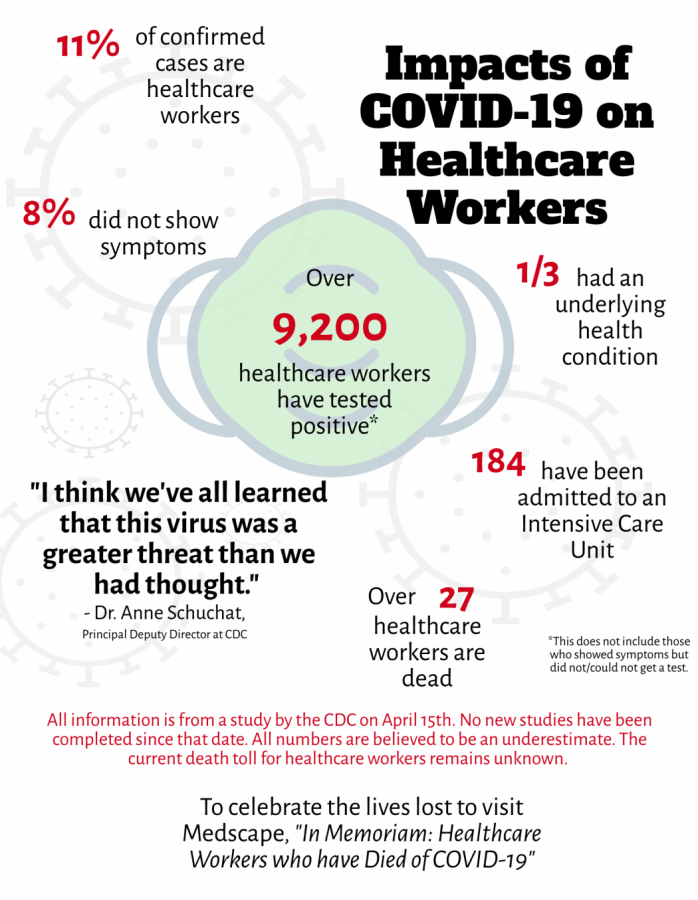Unprecedented times lead to unprecedented sacrifices
A nurse’s story of sacrifice amid the COVID-19 pandemic
May 10, 2020
The city and hospital where this is located is purposely left out in addition to the last name to protect the source.
Aside from the sliver of sun in the horizon, the sky remains dark. There are few cars in the parking garage but even fewer on the streets. As they walk into another 12-hour shift, large makeshift triage tents, where they assess COVID-19 patients from most critical to least critical, pass their vision. They see the refrigerator truck parked in the loading dock that will act as a makeshift morgue should the need arise. There are lines of workers waiting to go through body temperature scanners. The basement of the hospital is lined with broken ICU beds, where nurses who cannot go home sleep.
The hallways are empty. There are no families or visitors. The unit is solemn. There is no more joking that gets them through a shift. The tension can be sliced with a knife. The mask goes on and another battle begins.
This is life now for thousands of healthcare workers. From sunup to sundown, they spend their days chipping away at an iceberg with no end in sight.
What once were 8-hour shifts have turned into 12 or even 16-hour shifts. The body aches from 16 hours on their feet are the least of their worries. There are bruises on the bridges of their noses. Headaches from the tension. However, the majority of the pain comes from the situation.
The long hours and extra shifts add to the stress on their bodies. It is hard to eat a good meal or drink the adequate amount of water when a nurse is running from patient to patient. There are no families, so nurses have the obligation to become that hand to hold. In this line of work, they are accustomed to death, but no one could foresee the rising death tolls of COVID-19 related deaths. While nurses know the challenges that come with being a nurse, this pandemic brings up new challenges and exacerbates old challenges.
For nurses like Jaimie, an ICU nurse at a hospital in a hotspot city, she was always able to relieve herself of what happened that day when she went home to her family. For several weeks of this pandemic, she was left to come home to an empty house.
It was early on in this pandemic that personal protective gear (PPE) began to run thin.
The ICU that Jaimie worked at has turned into a COVID-19 ICU where they are primarily treating severe COVID-19 patients.
Two weeks ago, the nurses were given one N-95 mask and asked to keep it in a plastic specimen bag. This is the only form of mask that is known to filter out COVID-19 particles due to the respirator and the seal on it. They are meant to be thrown away after use. Several days later, the protocol changed to a surgical mask on top of the N-95 mask, in order to protect the few N-95 masks left.
“All of these things once banned by the CDC are now being approved. It feels wrong. I am lucky enough because I have some N-95’s that family gave me that will last me a little while,” Jaimie said.
At this current time, she is forced to wear a size medium mask, even though she is a small. That is on the rare occasion that she can get an N-95 mask. This makes it so that there is no seal to the face, meaning it is not fully protecting against COVID-19 particles. She uses surgical masks and bonnets made by family to protect herself once the PPE ran out. Her glasses act as a makeshift face shield. In this case, something is better than nothing.
“We should have been more ready than this,” Jaimie said.
Under these conditions, Jaimie is exposing herself to the virus every shift. She could get the virus at any one of her shifts and bring it home to her family, unknowingly. Because of this, she felt that she was left with no other option to protect her family but have them leave until the situation lessens.
This meant Jaimie had to say goodbye to her eight-year-old son and almost six-month-old baby girl.
The day she made the decision her husband asked her ‘is this worth it? What if we say goodbye to you now and we say goodbye for good? Are you doing this for the money or for the oath you took?’
“That is what the oath is for, times like this. You don’t see nurses taking the easy way out. You didn’t sign up to be a nurse and not do this,” Jaimie said.
When Jaimie went to work on her next shift, she said goodbye to her family and when she came home, the house was empty.
Jaimie is not the only nurse to make this decision. Many nurses do not have a place they or their families can go so they sleep in their cars or on broken ICU beds. They may live too far from the hospital and do not have enough time to go home and come back.
Yet, they are not only sacrificing their physical health and their families, but healthcare workers must also sacrifice their mental wellbeing.
“Of course, we see patients that pass, but it’s weighing on us to see one after the next. It seems like every five minutes that we hear another COVID patient is tanking. We try to forget when we come home,” Jaimie said.
For those long weeks Jaimie came home to no one, she would spend her days off on a video call laughing with her baby or doing virtual school with her son. Recently after several weeks of being away, Jaimie had to make another decision to let them come back home. The distance between them was taking a toll on her baby’s health.
Jaimie said that see feels like she missed a lot in those few weeks. Her six-month-old has become more vocal and flips over all the time.
“There was a moment where she didn’t seem to recognize me. And that was heartbreaking to know that I put her in that position,” said Jaimie.
With the new living arrangement, Jaimie wears a mask when in contact with her family, and distances herself.
“My son keeps talking about ‘I wish we could hug’ or ‘Can we hug after you shower?’ How do you tell your eight-year-old son, who isn’t going to want to hug you for much longer, ‘no we can’t [hug]’? It’s heartbreaking,” Jaimie said.
One of the hardest parts for healthcare workers in this position is not seeing that light at the end of the tunnel. They are making sacrifices without knowing when the end of it all will come. Jaimie explains that it is up to everyone to make small sacrifices, so they do not have to make any more large sacrifices.
“The people who don’t [self-isolate] are just making our jobs harder. They are dragging out the time that we have to be away from our children and cannot hug them,” Jaimie said.




Michele Merrill • May 22, 2020 at 1:14 pm
Kylie,
Thank you for reminding us of the major sacrifices that are being made by health care providers and their families.
You’re written an excellent article that everyone should read.
Well done,
Michele Merrill, MA
Health Educator
UNMC High School Alliance